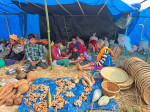History & Traditions
Held around Magh Bihu—the Assamese harvest festival—Jonbeel Mela usually takes place in mid-January at Dayang Belguri near the crescent-shaped Jonbeel Lake, from which it derives its name ("Jon" means moon and "Beel" means wetland in Assamese). This three-day-long traditional fair celebrates community harmony and social bonding between the hill and plains communities of Assam and Meghalaya.
The origins of Jonbeel Mela trace back to the 15th century AD, when it was first organized under the patronage of the Ahom kings and Tiwa (Lalung) rulers. Its purpose was not just economic exchange but also to strengthen political ties and cultural unity among the tribal and plain communities. Over time, it evolved into a vibrant cultural event that promotes “unity in diversity”, showcasing how ancient customs still hold relevance in the modern world.
Every year, thousands of people from different parts of Assam and neighboring Meghalaya flock to Jonbeel to take part in this rare event. The fair begins with the Agni Puja (fire worship) performed for the well-being of humankind. It is followed by a fascinating ritual of community fishing in the Jonbeel wetland, where locals gather early in the morning to catch fish using traditional methods—a sight that symbolizes cooperation and shared prosperity.
The highlight of Jonbeel Mela, however, is the barter trade, where tribal people from the hills—mainly from Tiwa, Karbi, Khasi, and Jaintia communities—descend to the plains carrying spices, herbs, fruits, vegetables, and handicrafts. They exchange these items with the plains people for essentials like rice, fish, salt, and traditional sweets (pithas). This unique trade tradition, free from the concept of money, fosters direct human connection and mutual respect among diverse communities.
Adding to the festive atmosphere, the Gobha King (Govaraja)—the traditional Tiwa monarch—visits the mela with his courtiers. They perform symbolic tax collection from their subjects, continuing a royal custom that dates back centuries. Before the mela officially starts, the Gobha Raja also participates in a community feast held on the banks of Jonbeel Lake, where villagers dine together, reinforcing social unity and togetherness.
Throughout the mela, visitors enjoy an array of cultural performances—folk music, Tiwa dances, traditional cockfights, and handicraft bazaars. The rhythmic beats of drums, colorful attires, and cheerful dances create a festive ambiance that attracts not just locals but also tourists and researchers interested in India’s intangible cultural heritage.
What makes Jonbeel Mela even more remarkable is its message of brotherhood and coexistence. It bridges the gap between hill tribes and plains communities, showcasing Assam’s inclusive spirit. The fair reminds everyone that beyond material wealth, it is cultural richness, human relationships, and traditional wisdom that truly sustain society.
As the world moves toward globalization and digital economies, Jonbeel Mela continues to stand as a symbol of sustainable and community-based living. Its preservation is not just about protecting a fair—it’s about safeguarding an age-old lifestyle that thrives on cooperation, nature, and cultural integrity.
For travelers, Jonbeel Mela offers a glimpse into the real essence of Assam—its festivals, its people, and its undying respect for tradition. The combination of rituals, rural market, community dining, and nature around Jonbeel Lake makes it one of the most unique and photogenic cultural experiences in Northeast India.
Jonbeel Mela Quick Info Table:
| Feature | Details |
|---|---|
| Festival Name | Jonbeel Mela |
| Type | Traditional Community Fair with Barter Trade |
| Location | Dayang Belguri, near Jagiroad, Morigaon District, Assam |
| Nearest City | Guwahati (30 km away) |
| Held During | Mid-January, coinciding with Magh Bihu |
| Duration | 3 Days |
| Unique Feature | Only fair in India where barter system still exists |
| Major Participants | Tiwa, Karbi, Khasi, and Jaintia tribes |
| Main Events | Community fishing, barter trading, traditional dance & music |
| Key Ritual | Visit and tax collection by Gobha Raja (Tiwa King) |
| Cultural Significance | Promotes unity, coexistence, and heritage preservation |
Jonbeel Mela FAQs with Short Answers:
What is Jonbeel Mela?
Jonbeel Mela is an annual traditional fair in Assam where people exchange goods through the barter system.Where is Jonbeel Mela held?
It takes place near Jonbeel Lake at Dayang Belguri in Morigaon district, about 30 km from Guwahati.When does Jonbeel Mela occur?
It is held every January, a few days after the Magh Bihu festival.Which communities participate in Jonbeel Mela?
Mainly Tiwa, Karbi, Khasi, and Jaintia tribes from the hills, and Assamese people from the plains.Why is Jonbeel Mela famous?
It’s India’s only fair where the ancient barter system is still practiced.What happens during the mela?
Activities include community fishing, cultural performances, and exchange of goods without money.Who is the Gobha Raja?
The Gobha Raja is the traditional Tiwa king who visits the mela to collect symbolic taxes.What is the meaning of ‘Jonbeel’?
‘Jon’ means moon and ‘Beel’ means lake; the name refers to the crescent-shaped lake near the fair.How old is Jonbeel Mela?
The fair dates back to at least the 15th century AD.Why should tourists visit Jonbeel Mela?
To witness India’s living barter system, rich tribal culture, and community harmony in action.





